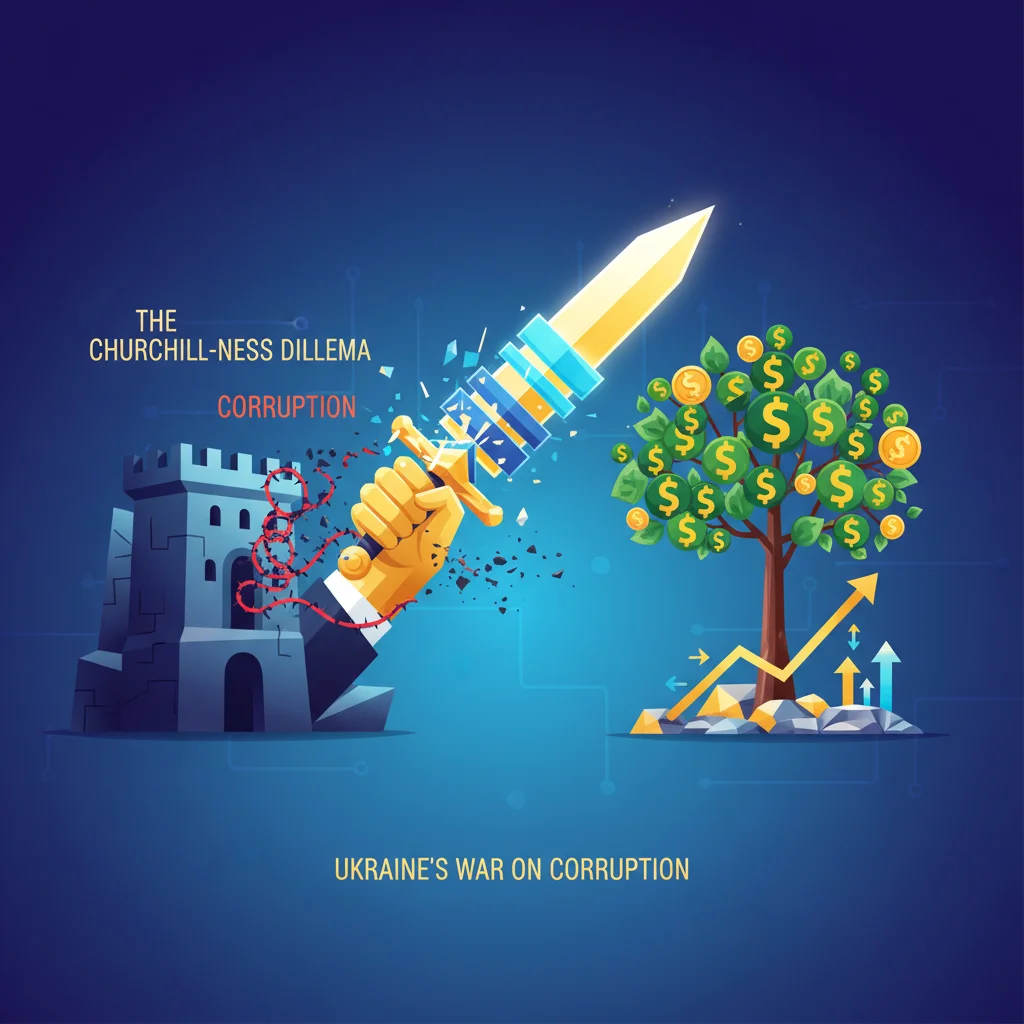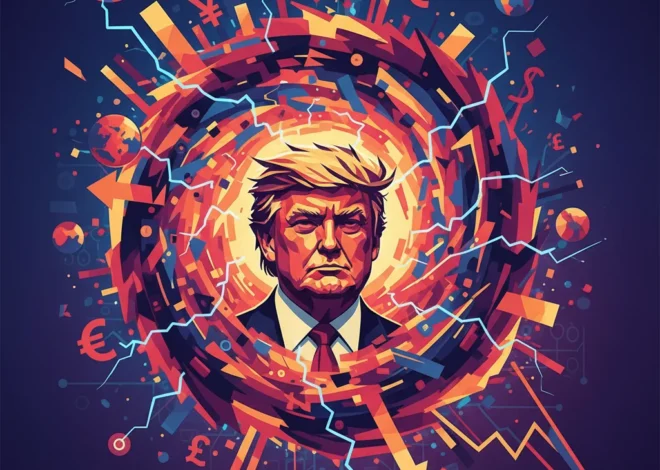
The Churchill-Ness Dilemma: Why Ukraine’s War on Corruption is the Ultimate Investment Strategy
In the annals of history, leaders are often defined by a single, monumental challenge. For Winston Churchill, it was rallying a nation against the tide of Nazism. For Eliot Ness, it was dismantling the deep-rooted corruption of Al Capone’s empire. Today, in the heart of Eastern Europe, Ukrainian President Volodymyr Zelenskyy faces the unenviable task of embodying both. He must be a Churchill on the world stage, galvanizing global support against a brutal invasion, and an Eliot Ness at home, waging a relentless war against the systemic corruption that has long plagued his nation. This dual mandate, as highlighted in a poignant letter to the Financial Times, is not merely a matter of political principle; it is the fundamental prerequisite for Ukraine’s survival, reconstruction, and long-term economic prosperity.
For investors, finance professionals, and business leaders, this internal struggle is as critical to watch as the movements on the battlefield. The outcome will determine whether post-war Ukraine becomes a beacon of opportunity and a thriving market economy, or a cautionary tale of squandered potential. The war for Ukraine’s soul is being fought on two fronts, and the world of finance has a profound stake in both.
The Churchillian Mandate: Uniting a Nation Against Overwhelming Odds
President Zelenskyy’s transformation into a wartime leader has been nothing short of remarkable. Much like Churchill, he has used powerful oratory and unyielding resolve to unite his people and inspire a global coalition. His leadership has been instrumental in securing billions of dollars in military and financial aid, which has been the lifeblood of the nation’s defense. According to the Kiel Institute for the World Economy, total committed aid to Ukraine reached over €170 billion by mid-2023, a testament to the international community’s faith in his government’s ability to lead the fight.
This Churchillian role is outwardly focused. It involves diplomacy, military strategy, and maintaining the morale of a nation under siege. It has successfully kept Ukraine’s cause at the forefront of the global agenda, ensuring the continuous flow of support necessary to sustain its defense and the basic functioning of its economy. However, this success on the world stage only throws the second, more insidious challenge into sharper relief.
The Eliot Ness Imperative: The Unseen War on Corruption
While the world sees the fight against tanks and missiles, an equally important battle is being waged against graft, oligarchic influence, and judicial malpractice. This is Zelenskyy’s Eliot Ness moment. Eliot Ness and his “Untouchables” became legendary not for fighting a foreign enemy, but for their incorruptible quest to clean up a system so rotten it threatened the very fabric of American society. For Ukraine, this internal enemy is just as dangerous as the external one.
Ukraine has long struggled with corruption, a legacy of its post-Soviet transition. This issue is not merely a matter of public perception; it has tangible economic consequences. It erodes trust, stifles competition, deters foreign direct investment (FDI), and creates an unstable business environment. For a country that will require an estimated $411 billion for reconstruction, according to the World Bank, proving it can manage these funds transparently is paramount.
To quantify this challenge, we can look at the Corruption Perceptions Index (CPI) published by Transparency International. While Ukraine has made notable progress, especially since 2014, it still has a long road ahead to align with the standards of the European Union it so desperately wants to join.
The table below illustrates Ukraine’s journey and its standing relative to other EU member and candidate states, highlighting the governance gap that investors and international partners are watching closely.
| Country | 2023 CPI Score (out of 100) | Status | Key Insight for Investors |
|---|---|---|---|
| Denmark | 90 | EU Member | Benchmark for transparency and rule of law. |
| Poland | 54 | EU Member | Represents a regional peer within the EU. |
| Romania | 46 | EU Member | Shows the journey of a post-communist state in tackling corruption. |
| Ukraine | 36 | EU Candidate | Shows improvement, but a significant gap remains. |
| Moldova | 42 | EU Candidate | A key regional comparator also on the path to EU accession. |
Source: Transparency International CPI 2023. A higher score indicates lower perceived corruption.
The Trillion-Dollar Question: How European Courts Are Reshaping the Future of Energy Investing
The Investor’s Calculus: Rebuilding on a Foundation of Trust
The reconstruction of Ukraine represents one of the most significant investment opportunities of the 21st century. The potential for growth in infrastructure, energy, agriculture, and technology is immense. However, capital is cautious. It flows where there is predictability, the rule of law, and a level playing field. Without a successful anti-corruption drive, the bulk of private investment will remain on the sidelines, waiting for the risk premium to decrease.
This is where the worlds of governance and finance directly intersect. Every successful prosecution of a corrupt official, every transparent government tender, and every judicial reform that strengthens property rights is a signal to the global market. These actions directly impact the country’s risk profile and, consequently, the cost of capital.
Furthermore, the fight against corruption is a fertile ground for innovation in financial technology. There is a historic opportunity for Ukraine to leapfrog legacy systems and build one of the world’s most transparent public finance systems. The use of blockchain technology for tracking international aid, smart contracts for public procurement, and advanced data analytics to flag fraudulent trading or banking activities are no longer theoretical. In Ukraine, they are a necessity. Implementing these fintech solutions would send an unequivocal message to investors that the country is serious about a new era of transparency.
Success in this internal war will unlock a virtuous cycle:
- Improved Governance: Reduces risk and builds trust.
- Increased FDI: Private capital flows in to fund reconstruction and new ventures.
- Economic Growth: A stronger economy generates tax revenue, reducing dependence on foreign aid.
- Strengthened Sovereignty: Economic independence solidifies political independence.
The Path to Europe: Where Economic Ambition Meets Governance Reality
Ukraine’s ambition to join the European Union is the strategic anchor for its reform agenda. EU accession is not just a political goal; it is a comprehensive framework for economic and institutional transformation. The accession criteria, particularly the Copenhagen criteria, place enormous emphasis on the “stability of institutions guaranteeing democracy, the rule of law, human rights and respect for and protection of minorities.”
For the financial community, Ukraine’s progress on its EU path is the single most important long-term indicator. Meeting EU standards on everything from banking regulation to competition policy and judicial independence is a non-negotiable part of the process. Each chapter of the EU acquis that Ukraine successfully adopts is another layer of risk removed for potential investors. This process forces the institutionalization of the “Eliot Ness” agenda, moving it from a personality-driven campaign to a permanent feature of the state’s architecture.
Conclusion: Winning the Peace is Harder Than Winning the War
President Zelenskyy has masterfully played the role of Churchill, uniting his nation and the world. But the enduring legacy of his leadership, and the ultimate success of Ukraine, will be determined by his ability to champion the spirit of Eliot Ness. The fight against Russia is a fight for survival, but the fight against corruption is a fight for the future.
For the global investment community, the message is clear. The future of the Ukrainian stock market, the stability of its economy, and the return on any investment made in its reconstruction are inextricably linked to the nation’s success in this internal war. The bravery of soldiers on the front lines must be matched by the integrity of officials in the halls of power. Only by winning on both fronts can Ukraine secure a lasting peace and unlock its immense economic potential, transforming from a symbol of resilience into a powerhouse of opportunity.
Ethereum at a Crossroads: Decoding the Battle Between Market Fragility and Whale Conviction


